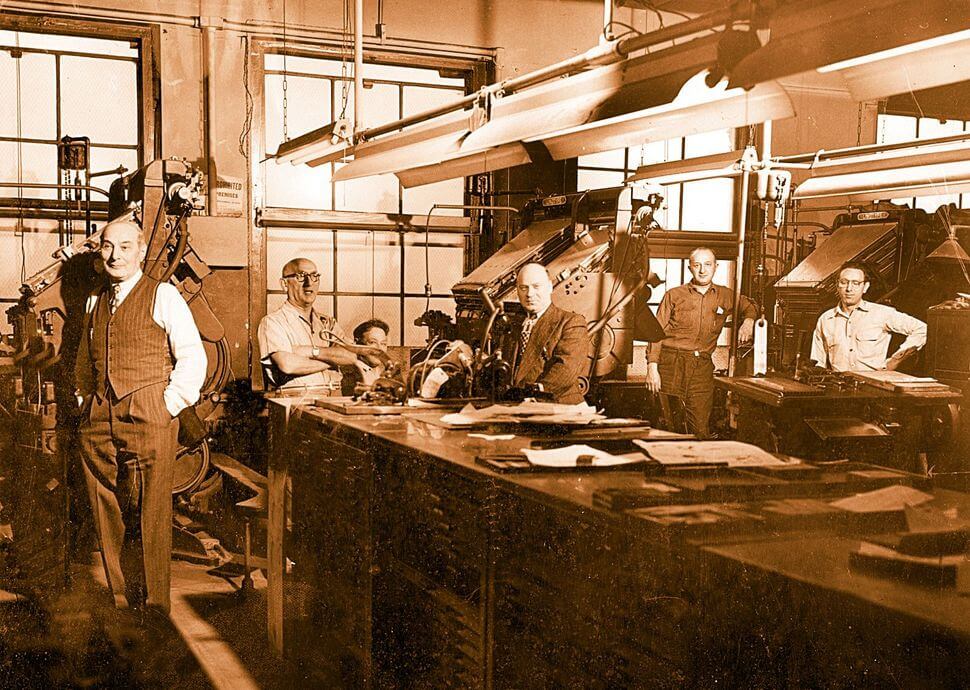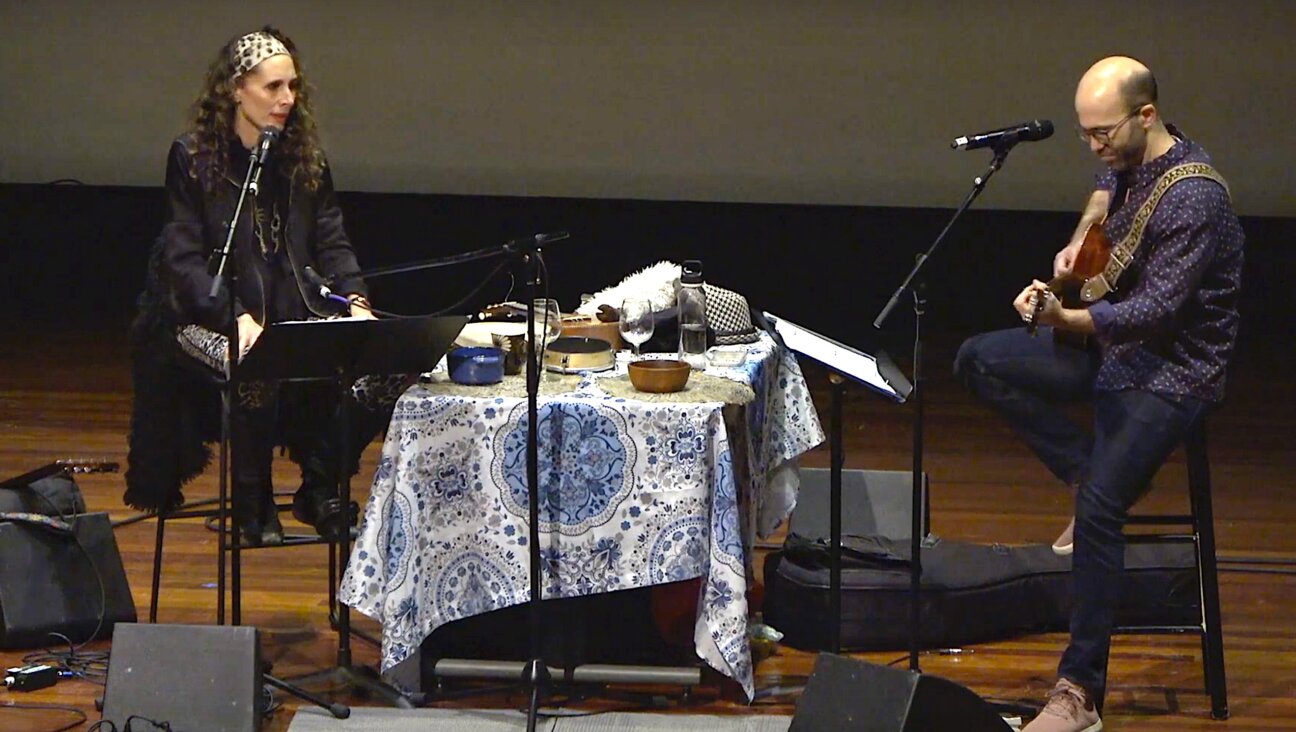How to use the Forward archive
Whether you’re looking for information Yiddish or English, here’s what the Forward archive can help with

Courtesy of Forward Association
The Forward was founded in 1897 and we have an archive that includes all sorts of historical material available (in Yiddish and English) in a number of different places.
With our help you can find what you are looking for. And with your support we can conserve and catalog our archive making it more visible and more available.
Whether you are looking for Yiddish or English, here are the different types of things we can help with at the moment (we’re always improving and expanding what we can do.)
- Find, or get rights to use, a photograph
- Find an article
- Find a print newspaper
- Find a person (either an author or the subject of a piece)
- Research ephemera
- Find correspondence or manuscripts
- Yiddish advice. (COMING SOON!)
Support Our Archive Now
Some Background
The Forward, a Jewish media organization, launched as an independent informative Yiddish newspaper in 1897 with a socially progressive perspective aligned with the developing democratic socialist forces at the time. Known as the Jewish Daily Forward or, in Yiddish, the Forverts, Article 2 of its constitution (published in 1949) envisions its mission as to promote and diffuse the “principles of International Social Democracy and Trade Unionism,” especially among the Jews in the U.S.
Equally important is its stated intent to create a general knowledge of literature, economics, civic, social, political and historical science and other useful information. So, an ambitious undertaking!
In the promotional booklet “The Jewish Daily Forward,” written for the Forward by its labor writer Yankev “J.C.” Rich, we see that with circulation peaking at 250,000 daily in the late 1920’s, the Forward was one of the world’s most widely distributed newspapers, with readership spanning the globe. It achieved much notoriety as the singular Yiddish newspaper with its own stringers — including photojournalists and novelists — overseas in Eastern Europe and in pre-state Israel (then known as Palestine).
Rich further describes how mail distribution brought the Forverts into homes in every state throughout the U.S. and every province of Canada. Standing up for organized labor, a fearless press, suffrage and civil rights the Forverts, published in Yiddish, continued to be a force for the integration of immigrants into American society, with all its attendant gifts and responsibilities.
Progressive in its publication values, and materially the most historically successful of Yiddish newspapers, no profit was sought to be derived from it and to this day, no individual owns it. The Forward Association, a voluntary collective association acts as the governance board and is the corporate owner. Originally, that board was reflective of the readership and was composed of those in the trade unions supportive of cooperative principles as a social system. It took early and frequent stands against all manner of political corruption at home and overseas. Based in Manhattan’s Lower East Side and uniquely focused on social justice at the board level, the Forverts was particularly effective in opposing New York City’s own special inbred political deceit.
It is this fearless approach that continues to set the tone for today’s Forward, in both its English and Yiddish incarnations. Both versions are online with related social, digital media and video and it is currently published monthly in both English, as a magazine, and in Yiddish as a newspaper.
An early adopter of the power of multi and social media, the Forverts built itself a historic 9-story home, eventually achieving landmark status in New York City at 175 East Broadway on the Lower East Side. WEVD, our radio station—broadcasting in Yiddish and known as “the station that speaks your language” was named for famed Socialist and Forverts’ supported presidential candidate Eugene V. Debs who received almost a million votes in 1920.
Yiddish language programs frequently included listener input and participation. Similarly, our beloved newspaper feature column a Bintl Brief published letters to the Forverts seeking all manner of advice as immigrant readers acclimated to their new homelands, sought jobs and, in time, eventually raised American children.
The Forverts eventually began a regular Sunday illustrated art-section insert known as the “roto” or “rotogravure” — in which among other images and illustrated news items, members’ photos of family and community events and celebrations were printed in the paper, as well as images of hometowns and loved ones still overseas in the old country.
Other early media-related ventures by the Forverts included a summer camp known as Camp Vacamas, established to afford the young impoverished tenement dwelling children of readers to experience the Catskills and to exit the city’s squalor in the heat of summer. At summer camp they engaged with the natural world and learned leadership and organizing skills. The camp is still in existence today, with a similar outlook, though it is no longer formally connected to the Forward Association.
Frequent ventures to develop income streams for the paper, in keeping with their stated goals, varied from selling phonographic recordings of Yiddish music stars (including various cantorial soloists) to selling dressmaking patterns and even sets of silverware. The Forverts had its own imprint and published among other things, a set of French novelist Guy De Maupassant in Yiddish translation and a set of the Old Testament in Yiddish.
Committed to survival in the modern era with reduced readership entailed selling the radio station and adding additional publications including a Russian language Forward newspaper with outreach to the newly arriving Jews of former Soviet bloc countries and commitment to the contemporary American Jewish reader by founding the English language Forward as an independently edited publication.
Our archival holdings included over 40,000 black and white images mostly created during the heyday of our Sunday illustrated issue in the late 1920’s-1950’s. Much of that material was shaped by our own Forverts writers and photographers, and a good deal was also purchased by the Forverts from various news agencies.
Additonally, there is a diverse array of historical materials available (in Yiddish and English) available in a number of different places.
Guide To Our Archive
We appreciate your interest and will do our best to provide answers or at least guidance. Keeping in mind that the Forward is a not-for-profit organization dependent on contributions, and with a minimal staff, we offer referrals to the institutions and individuals that can provide in depth research and translation services. Our archivist, can help direct some Forward specific issues, and will guide additional more in depth queries.
- If you need to find someone who wrote for Forward/Forverts, or someone who was in an article:
Search the online back issues archives of our newspaper
English here and
Yiddish here - If you read Yiddish: Here’s the online digital archive of our back issues at the National Library of Israel: Forverts
- If you don’t read Yiddish: You may get assistance from the research librarians at the New York Public Library’s 42nd Street Branch/Dorot Division (Jewish Division)
- For a more specific query you may email their Jewish Division: Dorot Division
- Or you could try the Center for Jewish History/YIVO where they have a list of freelance Yiddish researchers/translators
- If you can’t find the person on our websites: Email our archivist Chana Pollack explaining your query as precisely as possible (date, location, who/what) in order to expedite the research, detailing the connection and what the ultimate request is.
For example “I want to find that letter my ancestor sent to the Bintl Brief in 1906. Here is her name, and this is the date it was published, as near as I can find out.” - If you are looking for hard copies: As there is no index, we suggest having as narrow a date range as possible.
- For recent issues, try our current print fulfillment service.
- Some back issues of the Forward newspaper in English (1990-2017) and the Forverts in Yiddish (1984-2007) may be available, email our archivist to find out.
- You might find some more issues on microfilm at the New York Public Library, in the YIVO reading room at the Center for Jewish History or at New York University’s Tamiment Library
- Occasionally older historic issues can be found on Ebay
- Our archivist may provide the following services at no charge to subscribers:
- light translation from Yiddish/Hebrew
- photo research in our own archives
- light research on a Forverts writer
- Beyond that some fees might apply.
- For inquiries about finding photographs and obtaining the rights to use Forverts’ photographs: Please email our archivist Chana Pollack explaining as exactly as possible, what you are looking for and for what use.
- For help finding ephemera/correspondence/manuscripts/an individual writer’s archival papers: Aka for anything and everything around the individual’s career with us, email Chana Pollack explaining as exactly as possible, what you are looking for. (We regret that due to an incomplete archive and time constraints, she may not be able to exactly fulfill any search requests).
Support Our Archive Now
























